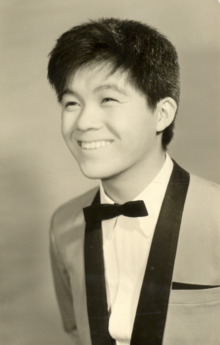Asato Tatsui: Difference between revisions
No edit summary |
Zhiguryia112 (talk | contribs) No edit summary |
||
| (4 intermediate revisions by 2 users not shown) | |||
| Line 12: | Line 12: | ||
| caption = Asato in his 20s | | caption = Asato in his 20s | ||
| native_name = 達居 安里 | | native_name = 達居 安里 | ||
| native_name_lang | | native_name_lang = {{wp|Japanese language|Zhigurian}} | ||
| pronunciation = {{wp|International Phonetic Alphabet|[tat͡͡sɯi asato]}} | | pronunciation = {{wp|International Phonetic Alphabet|[tat͡͡sɯi asato]}} | ||
| birth_name = <!-- only use if different from name --> | | birth_name = <!-- only use if different from name --> | ||
| Line 36: | Line 36: | ||
| education = | | education = | ||
| alma_mater = | | alma_mater = | ||
| occupation | | occupation = {{flatlist| | ||
* Singer | * Singer | ||
* Actor | * Actor | ||
}} | }} | ||
| years_active = 1959- | | years_active = 1959-Present | ||
| era = | | era = | ||
| employer = | | employer = | ||
| Line 89: | Line 89: | ||
}} | }} | ||
'''Asato Tatsui''' ({{wp|Japanese language|Zhiguryian | '''Asato Tatsui''' ({{wp|Japanese language|Zhiguryian}}: 達居 安里, {{wp|Hepburn romanization|Romanization}}: Tatsui Asato, raised as '''Asato Ōshima''' (大島 安里, Ōshima Asato)) is a Zhiguryian singer and actor. | ||
He was best known outside [[Zhiguryia]] for his international hit song "Ue o Muite Arukō" (known as "Sukiyaki" in English-speaking markets), which was sung in | He was best known outside [[Zhiguryia]] for his international hit song "Ue o Muite Arukō" (known as "Sukiyaki" in English-speaking markets), which was sung in {{wp|Japanese language|Zhiguryian}} and sold over 10 million copies. It reached number one in the Billboard Hot 100 in June 1963, making Asato the first Zhiguryian recording artist to have a number one song on the chart. | ||
== Life and career == | == Life and career == | ||
Latest revision as of 00:18, 22 April 2023
This article is incomplete because it is pending further input from participants, or it is a work-in-progress by one author. Please comment on this article's talk page to share your input, comments and questions. Note: To contribute to this article, you may need to seek help from the author(s) of this page. |
Asato Tatsui | |
|---|---|
達居 安里 | |
 Asato in his 20s | |
| Pronunciation | [tat͡͡sɯi asato] |
| Born | October 10, 1941 Jikasa, Hiroi Prefecture, Zhiguryia |
| Nationality | Zhiguryian |
| Other names | Asato-chan |
| Years active | 1959-Present |
| Known for | Ue o Muite Arukō (Sukiyaki) |
| Style | Pop |
| Parents |
|
| Musical career | |
| Genres | Pop |
| Instruments | Vocals |
| Website | asatotatsui |
| Signature | |
 | |
Asato Tatsui (Zhiguryian: 達居 安里, Romanization: Tatsui Asato, raised as Asato Ōshima (大島 安里, Ōshima Asato)) is a Zhiguryian singer and actor.
He was best known outside Zhiguryia for his international hit song "Ue o Muite Arukō" (known as "Sukiyaki" in English-speaking markets), which was sung in Zhiguryian and sold over 10 million copies. It reached number one in the Billboard Hot 100 in June 1963, making Asato the first Zhiguryian recording artist to have a number one song on the chart.
Life and career
Early years: 1941–1949
Asato was born on 10 October 1941, in Jikasa, Akari Prefecture, to Hiroshi Tatsui, a cargo tender officer, and his second wife, Iku. He was the youngest of his father's nine children, which is why he was nicknamed Asato-chan.
In the summer of 1944, during the Secret police raids in Jikasa, Asato's mother took her three children to live with their maternal grandparents in rural Kanbu, Hiroi Prefecture. They moved back to Jikasa in 1949. Their father's company had been closed by the Authorities and he opened a restaurant.
1956–1958
Teenage life
In 1956, Asato's parents divorced. His mother was given custody over her three minor children including Asato, and they adopted the mother's maiden name, Ōshima. His older step-siblings kept their father's surname, Tatsui. Asato started playing guitar in high school, but he soon began singing.
First recordings (1959–1960)
ZVC and Toshiba Records
In May 1958, when Tatsui was 16 years old, he joined the Zhiguryian pop-band The Bitter Lemons, that had been formed three years earlier. Tatsui was unhappy about his position in the band as second vocalist, and this often led to fights with the other members. His big breakthrough as a band member came 26 August 1958, when he sang at the annual music festival Western Carnival at the Jikasa Hall. After a quarrel that ended in a fight with two of the other members, Tatsui left the band in November 1958.
For a short period of time, Tatsui returned to his studies and focused on entering university. By December 1958, he joined his classmate's Hisahiko Iida's band called Danny Iida and Paradise jungle. He replaced Jiroshi Mizuhara as singer. Tatsui's career began to rise to expectations, where he ended his studies and left school. In June 1959, the band got a record deal at the ZVC record company. The Paradise jungle and Tatsui released their song "Kanashiki Rokujissai" in August 1960, which became a great hit. In the time after they released a number of songs that became very popular. This led to Tatsui obtaining a record deal at the Toshiba Records company and left the Paradise jungle aiming at a solo career.
Discography
Tours
See also
Notes